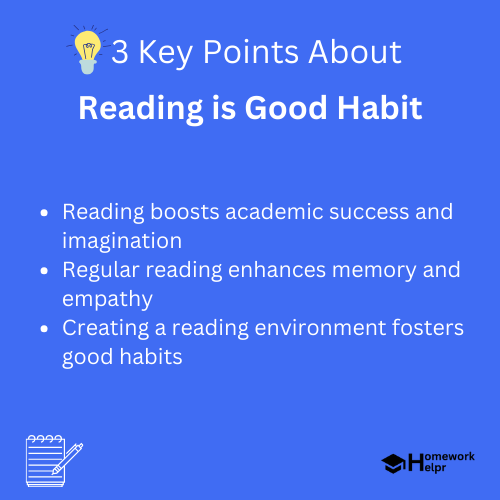📝 Summary
In today’s fast-paced world, instilling a habit of reading among students and children is crucial. Reading enhances imagination, cultivates critical thinking, and supports academic success. It allows students to gain knowledge, expand their vocabulary, improve concentration, and ignite creativity. Regular reading strengthens communication skills, boosts memory, reduces stress, and increases empathy. To cultivate this habit, create a reading-friendly environment, encourage exploration, and choose age-appropriate books that interest children. Ultimately, fostering a love for reading can empower young minds to navigate their lives successfully and think critically about the world. }
Reading is a Good Habit for Students and Children
In today’s fast-paced world, where technology often takes precedence, instilling a habit of reading among students and children is more important than ever. Reading is not just a way to pass the time; it opens doors to knowledge, enhances imagination, and cultivates critical thinking. In this article, we will explore the various benefits of reading, effective strategies to develop this habit, and how it positively impacts students’ lives.
The Importance of Reading
Reading is an essential skill that lays the foundation for academic success. It is not only about deciphering written text; it involves understanding and interpreting information. Engaging with books allows students to:
- Gain knowledge and expand their vocabulary.
- Improve their concentration and focus.
- Enhance their ability to analyze and synthesize information.
Moreover, reading ignites the imagination. When students dive into a book, they are transported to different worlds, meet new characters, and experience various cultures. This journey stimulates creativity and broadens their understanding of the world-making them more compassionate and empathetic individuals.
Definition
Vocabulary: The set of words known and used by a person. Academic Success: Achieving goals set out in educational contexts through learning and comprehension.
Examples
For instance, a child who reads fantasy novels may develop a vivid imagination and creativity as they envision magical worlds and creatures.
Benefits of Reading Regularly
Regular reading brings an array of benefits that go beyond just improving language skills. Here are some remarkable advantages:
- Strengthens Communication Skills: Reading enhances both verbal and written communication through exposure to different writing styles.
- Boosts Memory: Remembering characters, plots, and details from books enhances memory retention.
- Reduces Stress: Engaging in a good book can be a form of escapism that relaxes the mind and alleviates anxiety.
- Increases Empathy: Encountering diverse perspectives through literature fosters understanding and empathy towards others.
Each of these benefits contributes to a holistic development that shapes young minds into well-rounded individuals. Cultivating the practice of regular reading during childhood can set the stage for lifelong learning.
❓Did You Know?
Did you know that reading for just six minutes can reduce stress levels by up to 68%? That’s more than listening to music or taking a walk!
How to Cultivate a Reading Habit
Fostering a reading habit is a gradual process that requires patience and encouragement. Here are some effective strategies that parents and educators can utilize:
- Create a Reading-Friendly Environment: Establish a comfortable, quiet space dedicated to reading.
- Lead by Example: Show enthusiasm for reading by sharing your favorite books and authors with children.
- Encourage Exploration: Allow children to choose books based on their interests to keep them engaged and excited to read.
- Incorporate Reading into Daily Routines: Designate a specific reading time, be it before bedtime or during weekends.
Engaging children in discussions about the books they read also fosters deeper connections to the material. Ask open-ended questions to spark their curiosity and encourage critical thinking.
Examples
For example, after finishing a book together, ask your child what they think about the protagonist’s decisions and how they would have acted differently.
Choosing the Right Books
Selecting suitable books is crucial in maintaining a child’s interest in reading. Here are some tips to consider:
- Know Their Interests: Themes, genres, and topics that resonate with children will keep them engaged.
- Introduce Challenging Material Gradually: As their reading skills improve, gradually introduce them to more complex texts.
- Select Age-Appropriate Books: Books should align with the child’s reading level to prevent frustration.
Recommendations for different age groups can also be beneficial. For younger readers, picture books or easy readers can ignite their interest, while teenagers might prefer young adult fiction that addresses real-world challenges.
Definition
Protagonist: The main character in a story, often facing challenges and undergoing significant changes. Genres: Categories in literature that define the style or theme, such as mystery, fantasy, or historical fiction.
Examples
For a child interested in science, consider recommending books like ‚ÄúAstrophysics for Young People in a Hurry” by Neil deGrasse Tyson.
Conclusion
Reading is undoubtedly a good habit that students and children should embrace. It offers numerous benefits, from improved language skills to enhanced empathy and creativity. By cultivating a reading-friendly environment and encouraging children to explore various genres, we can help them develop a lifelong love for reading. Ultimately, in a world that is rapidly changing, the ability to read well can empower young minds to think critically, engage with diverse ideas, and navigate their lives successfully. So, let us inspire the next generation to pick up a book and embark on a journey of discovery!

Related Questions on Reading is Good Habit for Students and Children
What are the benefits of reading?
Answer: Reading improves vocabulary and enhances imagination.
How can parents encourage reading habits?
Answer: Create a reading-friendly environment and lead by example.
What types of books should children read?
Answer: Books that align with their interests and age level.
How does reading reduce stress?
Answer: Engaging with books acts as a form of escapism.
